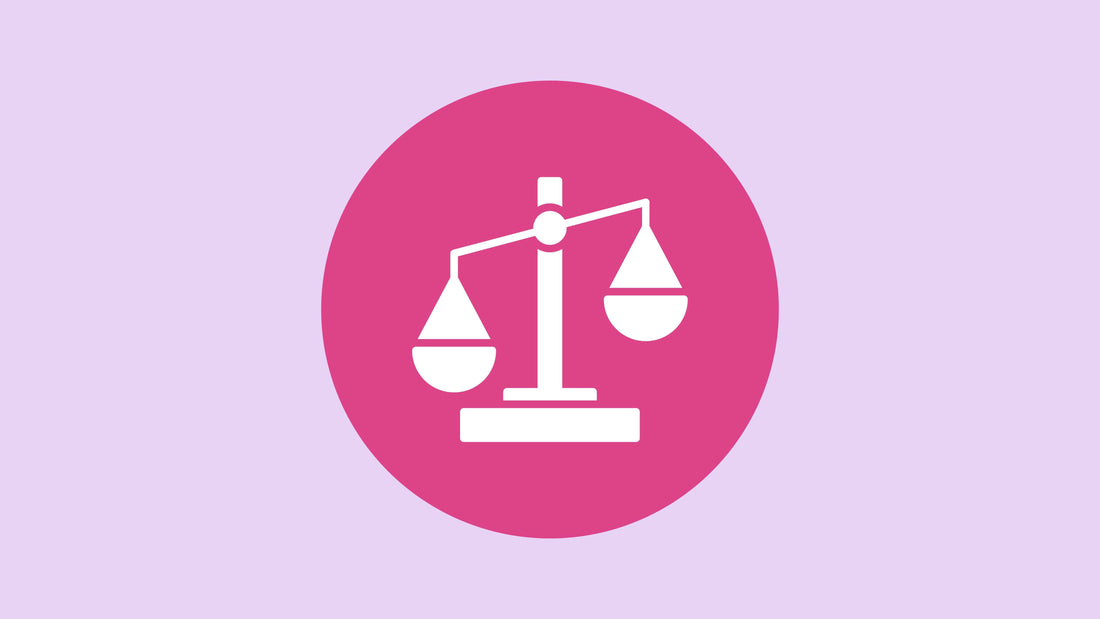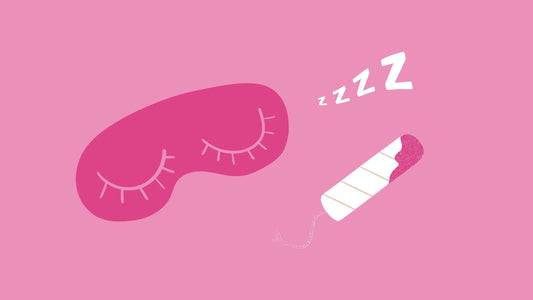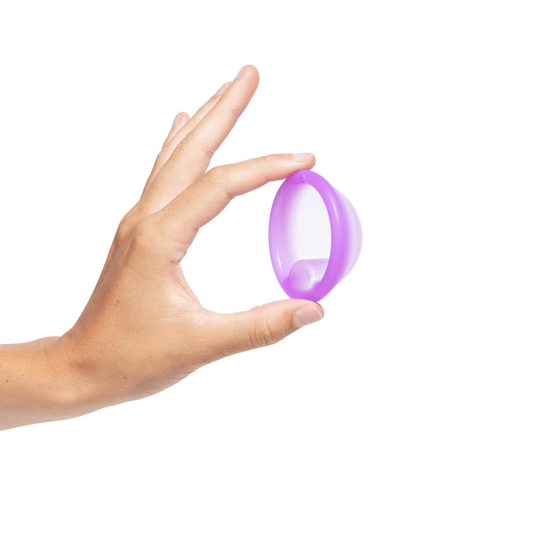
What is Hormonal Imbalance? How to Balance Your Hormones
Share
Did you know that hormones are responsible for our moods, energy levels, and even our weight? When they become imbalanced, it can cause a variety of problems. In this blog post, we will discuss what hormonal imbalance is, how to recognize the symptoms, and how to balance your hormones!
What are hormones?
Hormones are a vital piece of what makes the female body function properly. Hormones are your body's chemical messengers. They travel through your bloodstream to tissues or organs and tell them what to do. Hormones help your body maintain balance (homeostasis), metabolism, reproduction, mood, sexual function, sleep cycles, and more.
Hormones are also responsible for all stages of the menstrual cycle. Though it is normal for hormones such as progesterone, estrogen, prostaglandins, etc. to fluctuate with your menstrual cycle, hormonal imbalances can cause hormones to fluctuate more than the normal amount, which can cause your cycle to be irregular or even nonexistent. Read more on the menstrual cycle here.
Hormones tell your body what to do and when to do it. They are essential for life and your health, and when there is a hormone imbalance in the body, it can cause a variety of problems.
Hormonal imbalance in women
What is hormonal imbalance?
A hormonal imbalance occurs when there is an insufficient or excess amount of hormones in the body. This can happen when the body produces too many or too few hormones, when hormones are out of balance with each other, or when the hormone levels fluctuate erratically.
Hormonal imbalances can be caused by a variety of factors including, but not limited to:
- Poor diet
- Lack of exercise
- Chronic stress
- Certain medications
- Illness or disease
- Pregnancy and menopause
Because each hormone in the body has a different list of functions and processes, each of these causations can result in a different set of symptoms.
Common symptoms of hormonal imbalance
There are a variety of symptoms that can occur when there is a hormonal imbalance in the body. However, not every woman will experience all, or even any, of these symptoms. The severity and frequency of the symptoms will also vary from woman to woman.
The most common symptoms of hormonal imbalance include:
- Fatigue
- Insomnia or sleep problems
- Mood swings (irritability, anxiety, depression)
- Weight gain or weight loss
- Low libido (sex drive)
- Infertility
- Memory problems or brain fog
- Muscle aches and pains
- Joint pain
- Hair growth on the face, neck, back, and chest
- Vaginal dryness
- Headaches
- Hormonal acne
- Digestive problems
- Skin changes
- Hair loss or thinning hair
- Hot flashes or night sweats
As you can see from the lengthy list of symptoms, hormones affect MANY of our body's functions. This is why it is so important to keep them balanced!
How do you know if your hormones are imbalanced?
If you are experiencing a few of the above symptoms or even a long list of them, you should HIGHLY consider getting your hormones tested. Getting your hormones in check can drastically improve the quality of your life. Keep reading to see how to test and balance your hormones.
Which of your hormones are imbalanced?
There are many different hormones in the female body, but the ones that are most commonly imbalanced are estrogen, progesterone, testosterone, thyroid hormone, and cortisol. When these hormones become imbalanced, it can lead to a variety of problems.
Estrogen
Estrogen is the primary female hormone. It is responsible for the development of secondary sexual characteristics in women, such as breasts and hips. Estrogen also regulates the menstrual cycle, helps to keep bones strong, and protects against heart disease.
When estrogen is imbalanced:
You may experience irregular periods, PMS, hot flashes, night sweats, weight gain, hair loss or thinning hair, low libido, anxiety, and depression.
Estrogen dominance (high levels of estrogen) is linked to breast cancer, ovarian cancer, infertility and autoimmune disorders. Reducing estrogen levels are crucial if these are your circumstances.
Progesterone
Progesterone is a hormone that is produced by the ovaries during the second half of the menstrual cycle. Its main function is to prepare the body for pregnancy. Progesterone also helps to regulate the menstrual cycle, keep bones strong, and protect against heart disease.
When progesterone is imbalanced:
You may experience irregular periods, PMS, weight gain, anxiety, hot flashes, vaginal dryness, itchy skin, mood swings, and depression.
Testosterone
Testosterone is a hormone that is produced by the ovaries and adrenal glands. It is responsible for the development of secondary sexual characteristics in women, such as increased muscle mass and strength, and the deepening of the voice. Testosterone also helps to regulate the menstrual cycle, keep bones strong, and protect against heart disease.
When testosterone is imbalanced:
You may experience irregular periods, PCOS (Polycystic Ovary Syndrome), weight gain, hair loss or thinning hair, acne, low libido, and anxiety. High testosterone can cause hair growth on the face, neck, back, or chest, skin tags, deepening voice, clitoral enlargement, and darkening of the skin along neck creases, in the groin area, and under breasts.
Thyroid hormones
Thyroid hormones are produced by the thyroid gland and are responsible for regulating the body's metabolism. The thyroid is a gland that makes and stores hormones that help regulate the heart rate, blood pressure, body temperature, and the rate at which food is converted into energy. The thyroid hormones are crucial for every cell in the body.
When thyroid hormones are imbalanced:
Hyperthyroid- This occurs when you have underactive thyroid. Someone symptoms of this are weight loss, anxiety, irritability, and insomnia.
Hypothyroid- This occurs when the thyroid is overactive. Some symptoms of this are weight gain, fatigue, constipation, and depression.
Cortisol
Cortisol is a hormone that is produced by the adrenal glands. It is responsible for regulating stress levels, the sleep-wake cycle, your flight-or-flight response, etc. Learn all about the cortisol hormone here.
When cortisol is imbalanced:
When cortisol is imbalanced, you may experience anxiety, depression, digestive system problems, rapid weight gain or loss, high or low blood sugar, suppressed immune system function, etc.
How to balance your hormones
As explained above, when hormones are imbalanced, they create a plethora of issues within the female body. Now, do not let that discourage you! Let us discuss how we can heal our bodies and balance our hormones!
Testing hormone levels
Testing can be completed at your primary doctor's office using a urine, saliva, or blood test, and there are many online tests that you can buy that get shipped right to your home. These tests are facilitated by the purchaser. Some quality brands of at-home hormone testing kits include:
Estrogen therapy
If you're experiencing hot flashes or other uncomfortable symptoms of menopause, your doctor may recommend a low dose of estrogen. Estrogen comes in many forms, including pills, patches, gels, and vaginal creams.
Healthy levels of estrogen
Prepubescent female: Estrone- Undetectable–29 pg/mL, Estradiol- Undetectable–20 pg/ml
Pubescent female: Estrone- 10–200 pg/mL, Estradiol- Undetectable–350 pg/ml
Premenopausal adult female: Estrone- 17–200 pg/mL, Estradiol- 15–350 pg/ml
Postmenopausal adult female: Estrone- 7–40 pg/mL, Estradiol- <10 pg/ml
Progesterone therapy
If you are experiencing PMS or other symptoms of hormonal imbalance, your doctor may recommend a low dose of progesterone. Progesterone therapy comes in many forms, including pills, creams, and vaginal gels.
Healthy levels of progesterone
Prepubescent female: 0.1 to 0.3 ng/mL
Follicular phase of the menstrual cycle: 0.1 to 0.7 ng/mL
Ovulation: < or = 12 ng/mL
Luteal phase of the menstrual cycle: 2 to 25 ng/mL
Post-menopausal female: < or = 0.20 ng/mL
Testosterone therapy
If you are experiencing low libido, fatigue, or other symptoms of hormonal imbalance, your doctor may recommend a low dose of testosterone. Testosterone therapy comes in many forms, including pills, patches, gels, and creams.
Healthy levels of testosterone
Prepubescent female: 15 to 70 ng/dL
Pubescent female: 30 to 95 ng/dL
Premenopausal adult female: 20 to 80 ng/dL
Postmenopausal adult female: 15 to 70 ng/dL
Thyroid hormone therapy
If you are experiencing fatigue, weight gain, or other symptoms of hormonal imbalance, your doctor may recommend a low dose of thyroid hormone. Thyroid hormone therapy comes in many forms, including pills and injections.
Healthy levels of thyroid hormone
Free T- Thyroxine (T ): 0.82 to 0.92 ng/mL
Free triiodothyronine (T ): 0.79 to 0.85 pg/mL
Total thyroxine (T ): 95 to 155 nmol/L
Cortisol therapy
If you are experiencing anxiety, insomnia, or other symptoms of stress, your doctor may recommend a low dose of cortisol. Cortisol therapy comes in many forms, including pills, creams, and injections.
Healthy levels of cortisol
Awake: 700 to 900 nmol/L
Asleep: 600 to 800 nmol/L
Talk to your doctor
If you choose to test your hormones on your own, make sure you consult a professional about the next steps. We recommend taking these steps with your doctor, a functional doctor, or homeopathic physician.
Diet and lifestyle changes
Like nearly everything in life, balance is necessary. When we focus on having and maintaining a healthy body and lifestyle, hormones can naturally begin to balance by themselves.
There are many dietary and lifestyle changes that you can make to help balance your hormones. Some of these include:
- Eating a healthy diet
- Exercising regularly
- Reducing stress
- Getting enough sleep
- Avoiding exposure to toxins
- Quit smoking
- Limit alcohol consumption
There are many solutions to imbalanced hormones, and there are many ways to figure out which hormones are imbalanced to find the correct solutions.
With that said, thank you for reading this blog post! If you are struggling with hormonal imbalances, don't be alarmed. There is hope! You can get your hormones back on the right track. We hope you learned a bit about Hormonal Imbalance and what to do about it.
As always, we love you, Garnuu Girls!
XOXO,
-The Garnuu Team
DISCLAIMER: This content was written for informational purposes to educate women only. It is not medical advice.








